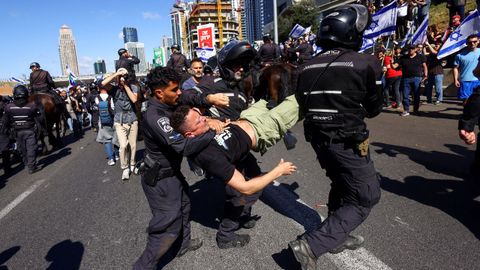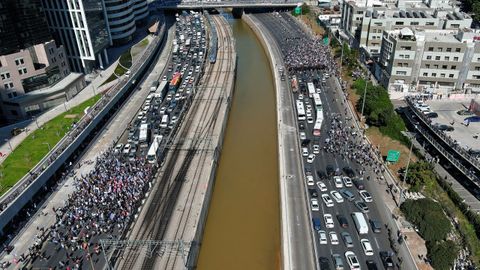
Israeli police officers detain a protester during a protest against Netanyahu’s judicial reform. RONEN ZVULUN | Reuters
The mass mobilization started ten weeks ago and they have the support of leading people from the economy, judiciary, culture and a growing number of military reservists.
Tens of thousands of Israelis protested again against judicial reform promoted by Benjamin Netanyahu’s right-wing government, in a mass protest movement that spread to Ben Gurion International Airport and for The main port of the country in Haifa.
Protests against the controversial initiative, which seeks to assign more executive powers to the detriment of justicewere expanded this Thursday to multiple fronts, covering air, sea and land and what organizers described as “Day of Resistance against Dictatorship”.

Blockade of roads in Tel Aviv as a sign of protest against Netanyahu’s judicial reform. ILAN ROSENBERG | Reuters
The participants spread across different parts of the country early in the morning, including the main commercial port, in the city of Haifa, north of Israel. There, a flotilla of navy reservists blocked maritime traffic, claiming that “the sea is closed in a dictatorship”, marking the first protest at sea since the protests began.
As has become common since the protests began ten weeks ago, protesters gathered in educational and political institutions in different cities and they blocked several roads across Israel, including Tel Aviv’s main artery, the Ayalon Highway.
During these cuts, there were clashes with the police and at least 15 protesters were arrested.
Tel Aviv rebelled against anti-minority rules
Tel Aviv, the financial heart of the country, was once again the epicenter of protests involving the usual large groups of workers from high-tech companies, who Hundreds of LGTBI activists joined, who have been warning for a long time that the judicial reform will especially affect the minorities in Israel.

OPEN SULTAN | EFE
However, this Thursday at Ben Gurion International Airport, in the suburbs of Tel Aviv, one of the most important and unusual demonstrations took place.
A continuous line of protesters for several hours difficult access to the airport with their vehicles, in order to prevent the departure of the prime minister, Benjamin Netanyahuwho went on an official visit to Italy.
“We have to protect democracy even if we have to block the whole country, because we refuse to be drowned by dictatorship,” Raúl Rodríguez, a 63-year-old Uruguayan-born resident of Tel Aviv, told Efe. «We want Netanyahu to leave and not return to Israel, No one wants him here, only the police,” he added, alluding to the trial against the president, accused of fraud, bribery and breach of trust in three different cases.
Due to the protests at the airport, the Prime Minister had to come by helicopter to board his planeyour flight to Romewhere he plans to meet with his Italian colleague, extreme rightist Giorgio Meloni.
“We will do everything possible to avoid disrupting the lives of the country’s citizens and we will not allow anyone to disrupt Israeli democracy and overturn the decision of the majority,” Netanyahu said before flying to Italy.
“This is not a matter of judicial reform at all. The goal here is to overthrow the democratically elected government just a few months ago and hold new elections,” condemned the president, who held a meeting with the US defense minister before taking off. Lloyd Austin.
Austin arrived on an official visit this Thursday, and due to the heavy concentration of protesters on highways in the center of the country, he was forced to hold meetings with Netanyahu and Defense Minister Yoav Galant, near the airport.

Big protest in Tel Aviv. DPA via Europa Press | EUROPAPRESS
In his speech, the Prime Minister referred to the negotiations with the opposition on the text of the judicial reform and pointed out that “efforts to reach an understanding are still continuing, but so far all these efforts have been met with general rejection and total rejection by the opposition and attempts to plunge the country into anarchy.
Israeli President Isaac Herzog, announced this week that mediation attempts They are “closer than ever” to reaching an agreement that allows consensual reform to be carried out, instead of the proposals of the Netanyahu government and its far-right and ultra-Orthodox partners.
What does the reform propose?
The original proposal, which continues to advance in Parliament, includes projects such as the so-called “cancellation clauses”, which this would allow a simple majority of representatives to annul decisions made by the Supreme Court.
Also included are initiatives that would give the government full control over appointment of judgeswhile allowing political officials to fill positions of legal advisors in ministries.
props
Protesters, who have the support of leading people from the economy, judiciary, culture and the growing number of military reserviststo reject this initiative considering that it would violate the separation of powers and would weaken the foundations of Israeli democracy.
Even before the reform project was presented, representatives of the Israeli judiciary were already sounding the alarm. From law firms to the chief judge, the rejection was practically unanimous.
“We are convinced that this initiative will not improve the system, but threatens to destroy it,” warns the letter signed by all living former state attorneys general.
President of the Supreme Court, Esther Hayut, condemned that the reform would “destroy the judicial system” and represent a “mortal wound to the independence of the judiciary”. They joined her 18 former judges of the Supreme Court, who warned that the planned changes are “a threat to the political system and way of life in Israel”.
Economists and the high-tech sector
Two former presidents of the Central Bank of Israel (BCI) announced a joint podium in Yedioth Aharonoth, the most widely read newspaper in the country, predicting that the weakening of justice will bring “a strong blow to the economy and the population, damaging their credit rating.
“To the extent that the market perceives that the legal reform harms the strength and independence of state institutions and increases uncertainty in the investment environment, this can harm economic activity,” warned the chief economist of the Ministry of Finance. Shira Greenberg.
The current president of BCI, Amir Yaronhe held several meetings with Netanyahu to warn him of the risk of capital flight and fears of international investorswhich could cause an “economic crisis at any moment”, he confirmed at those meetings according to the Hebrew press.
The banking sector warns against this 4,000 million shekels (1,050 million euros) have already left the country and large companies in the vital high-tech sector – which represents 15% of Israel’s GDP – such as Riskified or Papaya Global, have already announced their intention to leave the country.
In fact, high-tech workers are one of the pillars of the protest movement against judicial reform, and unusually, they have staged several work stoppages.
military
More than 400 former members of the security forces, incl senior military and intelligence officials Mossad and Shin Bethe pointed out that the first to be hit by the reform and its impact on the independence of the judiciary “will be the soldiers and security forces and their physical and legal defense”.
Just this week, a flood of reservists, from private soldiers to some of the most respected intelligence agents, announced that they would not provide the service as long as the Government moves forward with the planned changes.
“On Wednesday, March 8, we will devote time to speech and thought for the benefit of democracy and the unity of the people, therefore we will not report to reserve duty on that day,” reads the letter signed by 37 of the 40 reservists of the 69th Air Force Squadron, in charge of management of F-15 fighter jets.
In another letter sent to Netanyahu a day later, all living former air force commanders asked him to immediately end this reform, as the social tensions it has caused pose a “serious and tangible danger to the country’s security.”
Nobel Prizes
Group of seven winners The Nobel laureate published an open letter last month expressing his “deep concern” at what he described as “regime change with clear negative effects” on educational and research institutions “which represent the country’s economic and security engine”.
The letter warned of the dangers of looking like countries like Turkey, Poland and Hungary: “Scientific-technological research and advanced higher education thrive in democratic countries where there is a clear separation of powers.”
Source: La Vozde Galicia
I am Amelia James, a passionate journalist with a deep-rooted interest in current affairs. I have more than five years of experience in the media industry, working both as an author and editor for 24 Instant News. My main focus lies in international news, particularly regional conflicts and political issues around the world.







